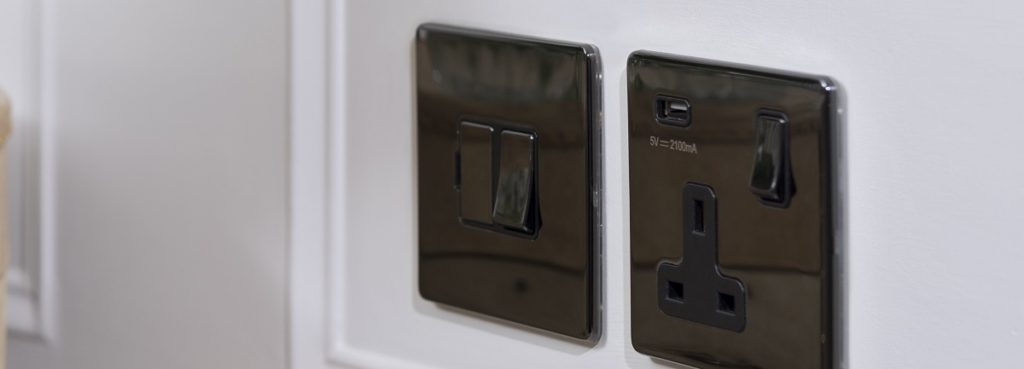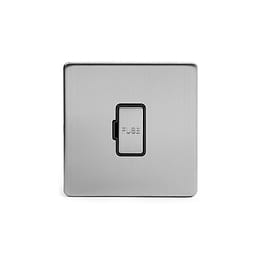What is a Fused Connection Unit (FCU)?
What is a Fused Connection Unit (FCU)?
A fused connection unit (or FCU) is an electrical outlet with an integrated fuse used for connecting permanently installed appliances such as fridges, dishwashers, and waste disposal units to a circuit. It is essentially equivalent to a fused plug and socket with a cable connected to an appliance, except it is permanently wired into the outlet and the fuses are often easier to change if needed.

Fused connection units are fitted with a fuse holder in the faceplate, protected by an easy-access cover. They usually take fuses from 3-amp to a 13-amp fuse and can safely run appliances up to a maximum of 3.1kW. Fused connection units can come in switched or unswitched varieties, and some also come with an indicator light.
As FCUs are equivalent to a fused plug and socket, and you can connect them by swapping out a regular plug socket for an FCU (providing it is a 1-gang socket). Alternatively, you can also run it on a separate cable from an existing regular socket on the main circuit, providing an additional level of isolation. FCUs can be completely hard-wired, with the cable to the appliance hidden in the wall, or with a visible cable permanently fitted into the faceplate.
Due to the need to safely de-rate the supply down from 32 amps, FCUs are unique to the UK.
Note: In the interest of safety, you should not undertake any work related to fused connection units, and should only be undertaken by a qualified electrician.
Where are Fused Connection Units Used?
Here are some examples of common uses of fused connection units:
- Integrated kitchen appliances, such as dishwashers, washing machines and fridge freezers
- Low-consumption hobs and ovens
- Cooker hoods
- Extractor fans
- Boilers
- Electric heaters
- Shaver sockets
- Waste disposal units
How does a fuse work?
Fuses in plugs are safety devices which are out in place to protect the lead, rather than the appliance. If too much current goes through them due to an overload or fault, they will blow. This is because they are deliberately made to be a weak link in the circuit. The blown fuse will then cut off the electricity, so the lead and the appliance do not overheat (which can cause a fire).
Types of Fused Connection Unit
There are several different types of fused connection unit, each with their own typical uses and advantages:
Single/Double Pole Fused Connection Unit
FCUs can come in single or double pole variants – the single pole isolating the live wire only, and the double pole isolating both live and neutral wires. The double pole is often used when a higher degree of isolation and safety is required, e.g. for higher-wattage appliances.
Unswitched Fused Connection Unit
This type of FCU only features a fuse holder, with no switch. An unswitched fused connection unit could be used for any appliance that has its own ON/OFF switch, such as a washing machine, or a device that operates continuously and must be difficult to turn off, such as a fire alarm or security lights.
Switched Fused Connection Unit
A switched FCU is an outlet where the cable to an integrated appliance is hard-wired and concealed in the wall (i.e. no plug, socket, or visible cable). It contains a fuse holder and a switch, allowing the unit to be turned on and off. This would typically be used for integrated kitchen appliances that do not have their own ON/OFF switch, e.g. a fridge freezer, which might require turning off for defrosting.
Fused Connection Unit with Flex Outlet
An FCU with a flex outlet is a wall outlet which has a flexible cable permanently wired into the faceplate, instead of being hard-wired into the wall. This might be used for appliances which may not normally be permanently integrated, but which may still require a safe means of isolation, such as an electric radiator or a hair dryer.
Replacing Fuses in an FCU
Fused connection units are fitted with a fuse holder in the faceplate, protected by an easy-access cover that allows fuses to be easily changed when needed.
Before replacing a fuse, it is essential that the issue that caused the fuse to blow is identified and corrected. Different types of fuse are required depending on the power consumption of the appliance, so if you need to change a fuse, it must only be replaced with another of the appropriate rating:
- Appliances rated at around 700W or below should be fitted with a 3-amp fuse.
- Appliances rated from around 700W to around 3000W require a 13-amp fuse.
In the UK, plug fuse ratings have now been standardised to either 3 amps or 13 amps. However, some older appliances still take a 5-amp fuse, which are still available for purchase. When replacing a fuse be sure to check the manufacturer’s specification.
[related_products is_auto_added="1"]









